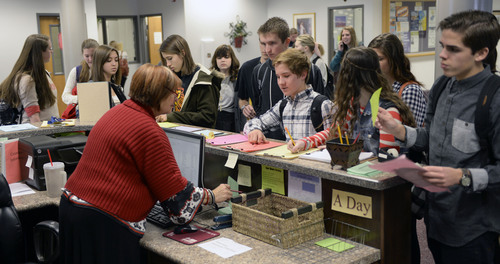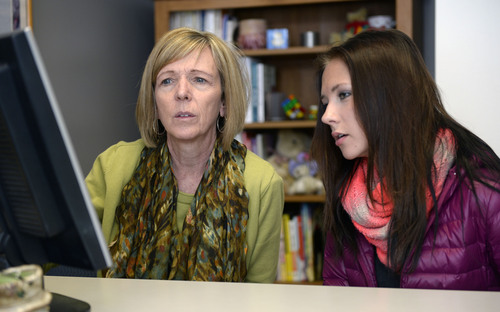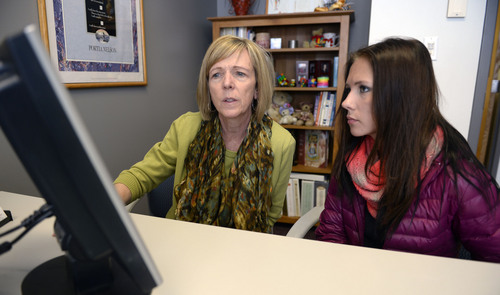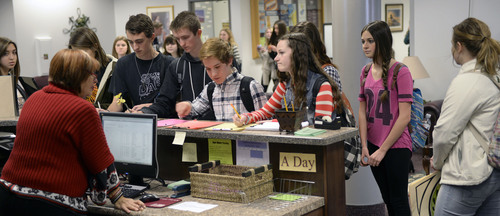This is an archived article that was published on sltrib.com in 2014, and information in the article may be outdated. It is provided only for personal research purposes and may not be reprinted.
Inch by inch, Utah is making progress toward having one school counselor for every 350 middle- or high-school students, according to a new state report.
But there's a growing consensus that, as Utah strives to have a more educated workforce by 2020, the state must do better to get more than the 700 current counselors to guide students toward post-high school technical training or academic degrees.
Gov. Gary Herbert is asking the Legislature to put $2 million more next year into school counseling, including Utah Futures, a website that helps students figure out career paths.
"The governor believes we need to improve counseling in our schools," said Lt. Gov. Spencer Cox. "Our counselors are spread too thin."
The governor has set a state goal to have 66 percent of adults with post-secondary degrees or professional certifications by 2020. "It's critical that our students and parents understand the opportunities that exist after school," Cox said last week.
Even as Utah school districts and charter schools as a whole meet the minimum state standard for the first time this year, 88 secondary schools still fall short.
The Utah Board of Education five years ago set a minimum standard for districts to have one counselor for every 350 students in grades 7 through 12.
(That's far looser than the ratio suggested by the American School Counselor Association for all schools, including elementary schools: one for every 250 students. Counselors are rare in Utah elementary schools.)
This year for the first time, the statewide average for secondary schools dropped to one counselor for every 349 students, down from one per 356 last year, said Lillian Tsosie-Jensen, who oversees counseling programs for the Utah Office of Education.
Her report based on fall 2013 numbers went to the State Board of Education on Thursday.
Most of the 88 schools that fell short were junior high schools, which typically have higher ratios, she said.
"We're slowly moving the needle of where we need to be," said Tsosie-Jensen.
—
'Help kids be successful' • The increasing emphasis on the counselor's role in helping students prepare for careers or college comes at the same time that students need more help navigating social and emotional waters.
Counselors are expected to help keep students from dropping out and to help them with mental health issues such as depression, family or friend conflicts, suicide or eating disorders.
Valerie Ross, who has been a counselor for 20 years, said, however, that counselors don't see their roles as bifurcated.
"It all just goes together," said Ross, president of the Utah School Counselor Association. "The way I see it, we just try to help kids be successful. Their social skills affect their academics and planning for the future."
Counselors must have master's degrees, with training in both academic and social counseling.
Ross is a counselor at Lone Peak High in Highland. The biggest need she sees is simply for more counselors.
"If I had 250 students instead of the nearly 400 I have, I'd have much more time to do the individual kinds of things with them," she said.
Lone Peak's counselors, like those in many high schools, meet once a year with students to assess their goals and ensure they're on track for graduation.
Counselors also help students schedule their classes and make changes in their schedules.
One of the biggest problems for counselors, according to a survey by the College Board in 2012, is that schools throw many unrelated tasks their way, taking away from time they can spend with students.
—
'A starting place' • Mary Shumway, director of career and technical education for the Utah Office of Education, said that when the state board set the standard at one counselor for every 350 secondary students, it was trying to be realistic.
"It was a starting place," Shumway said.
But the national standard of 250 students is optimum, she said, and Utah — like most states — falls far short of that when elementary schools are included.
According to data from the National Center for Education Statistics, Utah had the fourth-highest number of K-12 students per counselors in the country in the latest year for which national data is available, 2010-2011.
Wyoming had the best ratio — one counselor for every 200 students, while California had the highest, one counselor for every 1,016. Utah had one counselor for every 726 students, ranking ahead of only California, Arizona and Minnesota.
Davis and Wasatch districts have solid counseling programs for elementary schools, she said, but they're the only ones, even though increasing data show just how valuable counselors are in helping young children with academic and behavioral issues get on the right track.
Data also support more counseling for junior high students, particularly since 8th grade is often when students make pivotal choices, she said.
Shumway estimated that the ratio of counselors in Utah's junior highs and middle schools is one for every 400 or 500 students.
The reason?
"It's economic. It's really budgets."
Twitter: @KristenMoulton —
A call for counselors
National standards call for all K-12 schools to have school counselors, with a ratio of one for every 250 students.
The Utah State Board of Education considers them optional for elementary schools, and expects junior and high schools to have at least one counselor for every 350 students.
A report given to the board last week, however, said 88 Utah schools didn't meet that ratio in October. Altogether, Utah schools need to hire 28 more counselors to meet the state's recommended ratios.
These districts have the greatest gaps, needing this many more full-time counselors:
Davis, 4.82
Nebo, 4.67
Jordan, 3.78
Salt Lake City, 3.69
Provo, 3.62 —
'I Love My Counselor' Campaign
The Utah School Counselor Association is taking nominations from students, former students and adults to nominate their favorite Utah school counselors, past or present. A group will be honored during a Utah School Counselor Month event next month.
To nominate someone, email the counselor's name and school, and a 200-word or more description of their good works to contest@utschoolcounselor.org by Jan. 31.









